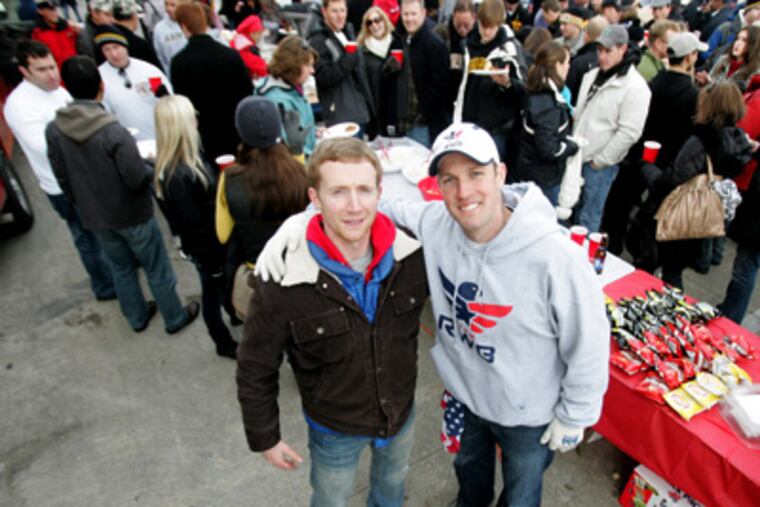An Army-Navy party for wounded vets
It makes sense that a marathon tailgate party at the Army-Navy game was organized by a bunch of long distance runners.

It makes sense that a marathon tailgate party at the Army-Navy game was organized by a bunch of long distance runners.
And so it was 5:30 a.m. when Mike Erwin steered a rented truck into M parking lot at Lincoln Financial Field – more than nine hours before the coin toss for the 111th gridiron showdown between the archrivals.
Their day kicked off with temperatures still in the 20's on a dark and quiet Saturday morning, a time when dedicated marathoners are usually out training. But for this special event, Erwin and his friends set up for what would be a long run of partying – through the afternoon kickoff and wrapping up with what these former West Pointers hoped would be victory drinks in the evening.
In addition to being one of the longest pregame parties at the storied football game – a Philadelphia tradition that takes occasional detours to Baltimore, New York and Washington, D.C. - it may have been the biggest, with 400 people, 300 pounds of hot dogs and hamburgers and three pigs. But it was all for a good cause.
They call themselves Team Red, White & Blue, and they do more than run – or party. Their ambitious goal is to transform the way wounded veterans are reintegrated into society when they return from combat and leave the service. The organization was founded in May by Erwin, a 30-year-old West Point graduate who is studying for a doctorate in psychology at the University of Michigan, and also happens to be an ultramarathoner.
Yesterday's tailgate party was a fund-raiser to help the fledgling group, which is based in Washington and Ann Arbor. Erwin sees parallels in his two passions, running and helping people.
"If you have that drive to go out and train two, three hours at a time, you have the drive to reach out and change people's lives," he said, between master of ceremony duties at the party.
As the war in Afghanistan enters its tenth year – and becomes the longest conflict in U.S. history - 4,400 groups around the country are helping thousands of soldiers who have been physically and mentally wounded in battle. Every year, busloads of injured veterans are brought to the game from Walter Reed Army Hospital in Washington and Bethesda Naval Hospital in Maryland, a trip organized and sponsored by the Army War College Foundation. This year's caravan was expected to arrive about an hour before the 2:40 p.m. start to the game, which Navy has won 54 times to Army's 49.
But Erwin believes he is onto something different, pairing those with post traumatic stress and brain injuries with advocates who will simply be their friends. He compares it to Big Brother/Big Sister.
"Our belief is that spending time together everyday is much more valuable than even counseling," said Erwin, an Army captain who will teach behavioral psychology and leadership at West Point in the fall.
Too often wounded veterans don't feel comfortable meeting new people or looking for jobs.
"They stay in their homes," he said. And computers make it too easy to take care of most tasks, even socializing, without leaving the house. "They disappear into the twilight."
So far, the organization has raised $110,000 from seven events, including the Dallas marathon last Saturday. Erwin alone has run 550 miles since Sept. 1 The money goes to pay for activities to support the newly formed friendships, such as ball games, dinners at restaurants or birthday gifts for the veteran. Forty people in D.C. and 20 in Michigan have signed up as advocates.
The Army-Navy game is just the type of carefree outing that he hoped the new buddies could enjoy together, though none were able to attend this year since the program is just getting off the ground.
"There are very few problems that can be solved by money. The solution resides in other people," said Erwin. "We need other people to be involved in the cause. We want to inspire people to get involved."
Sam Linn, a former classmate of Erwin at West Point, would love to be an advocate. After five deployments to Afghanistan and Iraq, the artillery officer from Cheltenham has seen every type of war injury, including those that end with a soldier's mother receiving a flag and her nation's thanks.
The worst, in his opinion, are those that are invisible to the eye.
"It doesn't look as much like a wound of battle but a defect in personality," said Linn, 30, who was recently promoted to major and who organized the tailgate party.
Linn returned home in July and is now studying for an MBA at the University of Pennsylvania's Wharton School, where he heads the Wharton Veterans Club. He is also an endurance athlete.
Any type of war injury is a "sign of sacrifice of what these young men have given," Linn said.
But when a soldier suffers mentally, "he doesn't get the same credit as a guy with a prosthetic limb does."
Some of his friends have had difficult adjustments after serving in battle, he said. Those with the most support recover the quickest.
"We're all there for them," he said, "as long as they need us."
But as the war drags on for nearly a decade, some soldiers may have no one to turn to.
"As a nation," he said, "it's hard to get people to pay attention to something that painful for that long."